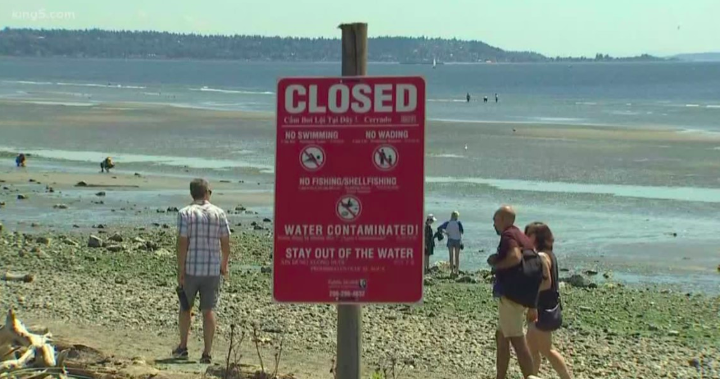
Photo: King 5 News
Authorities in King County (Seattle), Washington are investigating why two large sewage treatment plants failed late last week, causing the release of approximately 4 million gallons of untreated sewage into Puget Sound and forcing the closure of the Sound for swimming and fishing at several popular beaches over the weekend. The discharges occurred when the plants temporarily lost power and their back up power supplies did not work either. Most of the beaches will re-open for swimming today.
Why This Matters: Sewage overflows into lakes, rivers and coastal waters are happening all too often now – thousands of them across the U.S according to a recent report. Strong storms and flash flooding are overwhelming many water treatment systems — we have seen that happen in the midwestern floods this spring, in Washington, D.C, and now Seattle, among others. This kind of pollutions is serious. Coming into contact with untreated sewage can cause serious illnesses including gastroenteritis, skin rashes, and upper respiratory infections, and children and the elderly may be especially vulnerable to such waterborne illnesses. Violations for spills like this one, particularly when they are part of a pattern, must be enforced — industry must not think spills like this one are just part of the cost of doing business.
History of Sewage Violations
- One of the facilities, the West Point plant, had been the site of a massive spill in 2017 when nearly 250 million gallons of sewage and untreated stormwater poured into Puget Sound.
- As of Sunday afternoon, at least nine King County beaches remained closed because of the high bacteria levels, according to state’s Department of Ecology.
- This type of power disruption could constitute an “unauthorized discharge” that would violate Washington state’s water quality permits for the treatment facilities.
Storms Also Cause Overflows
- In Seattle, the number of beach closures this year has been higher than in recent years — one park was closed to swimming and fishing for five days after a sewage overflow in June.
- “Heavy rains may have contributed to that … Often times, there might be a sewer overflow whenever there’s rain. That will sometimes cause a beach closure,” Camille St. Onge, spokeswoman for the Washington Department of Ecology, told the Seattle Times. “The heavy rains wash a lot of the stormwater, which can carry fecal bacteria, down to the shoreline … and then that raises bacteria levels.”
July 21, 2019 » flooding rains, overflow, sewage, storm water, water pollution


